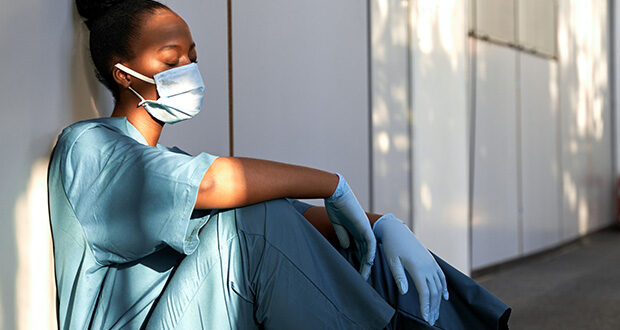An estimated 15 out of 100 registered nurses and midwives working in NSW could be experiencing symptoms of post-traumatic stress disorder due to Covid, a new report has revealed.
The Rosemary Bryant Research Centre surveyed 2,300 nurses and midwives across NSW on the challenges they have faced on the front over the past three years.
They found that nearly 300 respondents suffered from high-stress levels and met the clinical classification for PTSD.
Shaye Candish, secretary of the Nurses and Midwives Association NSW branch, called for urgent investment to protect the mental well-being of nurses and midwives.
"They're constantly being asked to do more than they're capable of doing, which leads to significant guilt that then creates this sort of cycle of trauma," Candish said.
"We need to combat the growing levels of psychological harm experienced across the workforce.
"It needs to stop now."
PTSD is characterised by an inability to recover after a person experiences or witnesses one or multiple traumatic event(s).
A person with PTSD might experience anxiety, heightened reactivity to specific triggers, depression, flashbacks and nightmares.
Nurses and midwives surveyed flagged overwork, exhaustion and burnout as key contributors to their poor mental and physical health.
One respondent expressed feeling 'stressed out and lonely' while working 12-hour shifts alone with a tubed patient in one room.
Another nurse on the Covid ward shared how she supported staff through 'countless traumatic deaths' and had received 'repeated phone calls from families telling her that she was responsible for killing their loved ones.'
"I reached out to executives, and they told me that I had it easy and shouldn't be difficult and complain," she said.
Nurses and midwives are at increased risk of developing PTSD due to their direct and indirect exposure to traumatic events in clinical settings.
Moreover, it's estimated that 95 per cent of nurses and midwives have at least once experienced violence or aggression in the workplace.
During the pandemic, healthcare workers faced high levels of psychosocial distress because of understaffing, extended shifts and little support.
Candish said the need for adequate staffing and skill mix has never been higher.
"Rather than trying to normalise the trail of destruction Covid has left, we need a system-wide, solutions-driven focus," Candish said.
"We need improved reporting of workplace psychosocial hazards and increased risk mitigation measures to address occupational violence.
"We must restore professional pride and fulfilment, which will enable nurses and midwives to stay motivated and keep delivering the clinical care we trust only them to provide."
The NSWNMA commissioned the Rosemary research report last year to better understand the force's workload and mood after two years of Covid.
Half of the nurses and midwives surveyed reported working significantly harder and more during the pandemic.
Ninety per cent said it had increased overall since the pandemic started.
Around one-fourth of the respondents said they worked 'a lot more than they would like.
On average, nurses and midwives worked an extra three unpaid hours each week.
Despite the reduced pressure of Covid on Australia's healthcare, half of the nurses and midwives said they continued to work the same hours as during the pandemic.
Over 40 per cent said it decreased only a little.
One senior registered nurse told the Rosemary research team that the workforce was 'emotionally on the verge of a breakdown.'
"We have had it," she said.
"I would not recommend nursing to anyone – we work like dogs and are expected to keep going.
"No one should have to work with the pressure, physical demand and disrespect that we do.
"We give and give and give until one day we can give no more."
Do you have an idea for a story?Email [email protected]
 Nursing Review The latest in heathcare news for nurses
Nursing Review The latest in heathcare news for nurses

